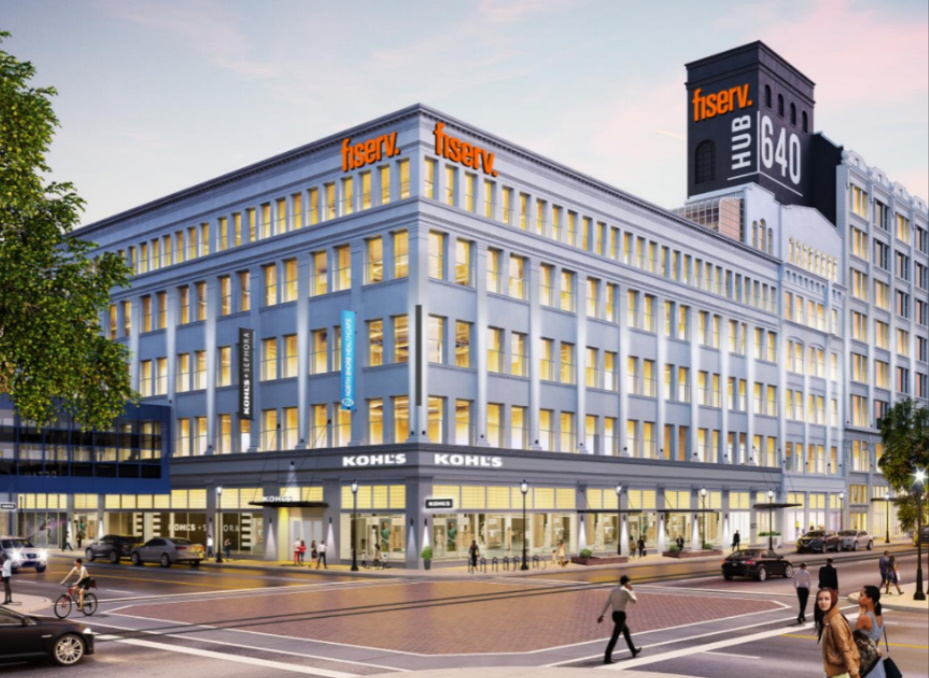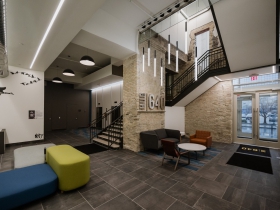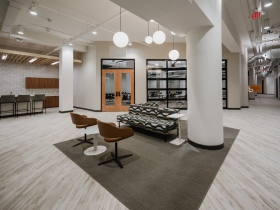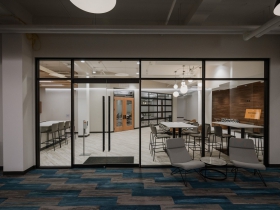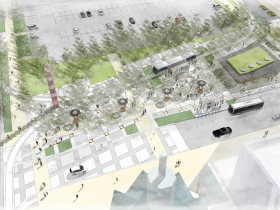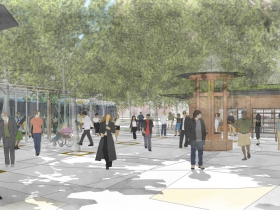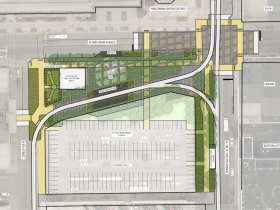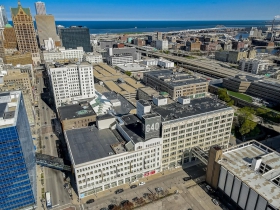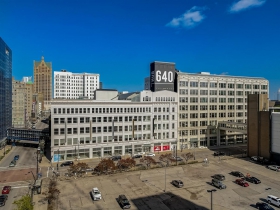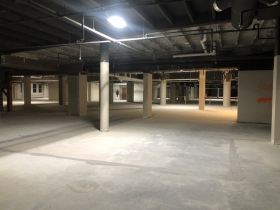Fiserv’s Move Downtown Is About Attracting ‘Young, Diverse’ Workers
Council committee endorses complicated subsidy for Brookfield company's relocation.
The relocation of financial technology services company Fiserv’s headquarters from a suburban office campus in Brookfield to an urban, mixed-use building in downtown Milwaukee is about developing the international company’s future workforce.
“We felt like attracting young, diverse, dynamic talent, we had reached a ceiling in our current location,” said Fiserv senior vice president Ryan Smith on Tuesday to the Common Council’s Zoning, Neighborhoods & Development Committee. “We felt it no longer reflected us, who we are as this technology, forward-thinking company.”
The committee unanimously recommended the full council adopt the agreement, which would also provide $4.6 million for public improvements including redesigning W. Michigan St., improving Zeidler Union Square and creating Vel Phillips Plaza.
Fiserv would lease 144,000 square feet of space in the eight-story HUB640 building at the corner of W. Wisconsin Ave. and N. Vel R. Phillips Ave. and invest at least $37 million into the project. Using a tax incremental financing (TIF) district, the city would effectively reimburse the company by rebating Fiserv’s property tax payments, plus interest, for a period of no more than 20 years.
Smith said the subsidy was a key factor in deciding to relocate to Milwaukee as part of what he said was a competitive process.
The company’s move has been several years in the making. In 2017 the Fortune 500 company confirmed it was considering multiple sites in Milwaukee, but never moved. In 2019 it acquired First Data Corporation for $22 billion and set about restructuring or closing several dozen of its offices spread across the country.
“We obviously wanted to keep that headquarters here and keep some of that growth here,” said Dan Casanova, the Department of City Development‘s senior economic development specialist. The company is a key piece of the international financial marketplace and reports processing 12,000 financial transactions per second.
And even though the resulting office won’t be among the company’s largest, per the term sheet, it must be referred to as the “global headquarters” in firm marketing materials.
In landing Fiserv, the city is also helping bring new life to a largely vacant building. The building was previously home to the flagship Boston Store and parent company Bon-Ton’s corporate headquarters, until the latter’s 2018 liquidation. Unlike when Bon-Ton closed, the surrounding Westown neighborhood is now on a major upswing. The Bradley Symphony Center opened, The Shops of Grand Avenue is now The Avenue, the Wisconsin Center is being expanded and Milwaukee Tool opened a major downtown office.
Kohl’s, in July, announced it would open a smaller-format department store on the northern half of the first floor. Fiserv would lease the southern portion of the first floor as a lobby with the offices and cafeteria on the third, fourth and fifth floors.
The agreement sets a four-year ramp-up period that starts at 580 employees in 2024 and grows to the full amount of 780 jobs in 2027.
The company hopes to move in by the end of 2023. “We would like it to be sooner, “said Smith. “We are anxious to get in there as soon as we possibly can.”
Smith, in speaking before the Redevelopment Authority of the City of Milwaukee last month, said the company would see a visibility boost from locating its headquarters near Fiserv Forum, the basketball arena for which it holds the naming rights.
The TIF term sheet says Fiserv is expected to relocate employees working in finance, communications, IT, product development, human resources, benefits and legal services.
Smith said he expected the hiring of new workers to be frontloaded and that the company is committed to doing job fairs in targeted ZIP codes to hire disadvantaged Milwaukee residents. That includes hiring for contracted, service-industry positions to support the office workers.
Fiserv, said the New York-based executive, pays an average of $80,000. “I think that’s an important statistic, because one thing the city has not enough of is high-paying jobs,” said committee chair Alderman Michael Murphy.
“I don’t know that we’re saying we’re not going to do a community benefits agreement,” said Smith. He said it was just too early. “We are committed to continuing those conversations.”
Peter Rickman, president of Milwaukee Area Service and Hospitality Workers Organization, said the agreement was important to rebuilding equity in the city. “We are talking about a development across from Zeidler Union Square and I think that’s wonderful symbolism here,” he said. Rickman said it was important for Fiserv to ultimately enter into a community benefits agreement similar to what the Milwaukee Bucks did at Fiserv Forum which provides for union rights
Area Alderman Robert Bauman said he believes the proposed TIF term sheet satisfies the council’s 2019 CORE resolution, which calls for downtown workers to be paid a minimum of $15 per hour and given union-level protections. Bauman and Rickman were the leading proponents of the CORE proposal.
Given a shift to remote work, the agreement includes a detailed structure to determine who qualifies as an employee.
A full-time employee is defined as any employee who works at least 35 hours per week, receives healthcare benefits and is paid more than 150% of the federal minimum wage. Workday occupancy at the facility must be at least 60% of the reported full-time employee count. Similar to the Milwaukee Tool agreement, Fiserv can count employees who live in the city but work from other facilities or at home as part of the total.
Smith said of the current workforce, 136 employees live in Milwaukee. He expects that to grow.
“We are a little bit concerned about retention,” said Smith of the relocation process. He said he expected the initial workforce to primarily drive to the office and park in the adjacent parking structure, but that future workers would likely live closer to the facility and possibly use other modes of transportation. He said the company favors people working in the office.
The nearby transportation network is one issue the city hopes to fix with the increased property tax revenue from the Fiserv deal.
Public Improvements
In addition to subsidizing Fiserv, the city would use the TIF district to fund $4.6 million in public improvements in the area. The revenue would come from increased property tax payments by property owner North Wells Capital on behalf of Fiserv, Kohl’s and a handful of other office tenants it has landed.
The city would spend $2.5 million to make improvements to W. Michigan St. between the Milwaukee River and N. 6th St. Fiserv’s front door is expected to face the street. Improvements include traffic calming elements, an all-ages bike facility, new pavement, street trees, landscaping, signals, street lighting and stormwater features.
A total of $750,000 would be allocated to the partial development of Vel Phillips Plaza on the city-owned parking lot a block west of the development. Initially proposed in 2019 as part of a proposal to extend the streetcar system, the plaza would for now move forward without the transit improvement. At the time, the full plaza was estimated to cost $5 million.
Casanova said the funding would go towards an art piece or sculpture to honor Phillips and kiosks for the planned plaza. He said the city has been working with the family on the proposal.
The plaza would be along the former N. 4th St., now named for Vel Phillips. The civil rights trailblazer was the first Black woman to graduate from the University of Wisconsin Law School, and the first woman and first African American elected to the Common Council. She was also the first female judge on the Milwaukee County Circuit Court and the first African American judge in Wisconsin. In 1978 Phillips became the first woman elected to the office of Secretary of State, becoming the first African American to ever win a statewide election.
The public improvements also include $1 million for streetscaping improvements around HUB640, executed by North Wells and advanced on a reimbursement basis.
Milwaukee County would receive $100,000 to make improvements to Zeidler Union Square, which is immediately south of HUB640.
Approximately $75,000 would be allocated to improvements to the intersection of N. 6th St. and W. Michigan St. The proposal includes removing high-speed turn lanes and adding traffic calming elements and pavement. The intersection is to see its traffic volume increase with the redevelopment of The Avenue, Milwaukee Tool and Fiserv’s relocation and the proposed Iron District.
“There are just a lot of utilities and complications. We are not ready to start the construction yet, but we want to get started on that design,” said Casanova.
Additionally, $175,000 would be placed in a public improvements contingency fund.
If all goes according to plan, the city could harvest additional incremental tax revenue in the future to fund additional public improvements within a half mile.
Building History
The oldest portion of the HUB640 complex dates back to 1895, with the five-story portion constructed in 1911 and the eight-story portion in 1920. North Wells acquired the property in 2017, planning to redevelop it in part for Bon-Ton.
The city granted North Wells and Bon-Ton a $1.9 million TIF subsidy to retain the retailer by downsizing its footprint. Casanova said $608,000 was spent on interior demolition and the rest remained in escrow, until being returned to that larger TIF district after the retailer’s liquidation. Despite Bon-Ton’s dissolution, the interior demolition work ultimately benefited North Wells’ redevelopment said Commissioner Lafayette Crump.
Ald. Russell W. Stamper, II and Council President Jose G. Perez disputed the efficacy of that spending. “I think that $600,000 was a significant loss,” said Perez.
In 2021, North Wells gutted and rehabbed each of the former Bon-Ton floors. New common spaces were developed and a portion of the loading dock structure was converted to a rooftop deck.
Working with Founders 3, North Wells successfully attracted North Shore Healthcare, Eight Eleven Group and Abacus Architects to the building. Engberg Anderson Architects and Kelly Construction & Design led the design and construction on the redevelopment. CBRE represented Fiserv in its location search.
The complex, legally three condominiums, is expected to climb in assessed value from $26.4 million to $59.6 million. Included in the district is the 74-unit apartment building at the top of the building. Developed by the Mandel Group nearly two decades ago, its units are now owned by North Wells.
North Wells is in the process of purchasing the parking structure to the west, 615 N. Vel R. Phillips Ave., currently owned by Zilber Ltd. and operated by Interstate Parking. Connected by a skywalk, the structure is expected to be used and largely filled by Fiserv employee vehicles.
A copy of the proposed TIF district authorization document is available on Urban Milwaukee.
HUB640 Redevelopment Photos
2019 Vel Phillips Plaza Renderings
HUB640 Aerial Photos
Former Boston Store
More about the Fiserv Relocation
- See Inside Fiserv’s New Headquarters - Jeramey Jannene - Mar 4th, 2024
- Plats and Parcels: Unusual Sign Will Resolve Kohl’s-Fiserv Conflict - Jeramey Jannene - Feb 4th, 2024
- Eyes on Milwaukee: HUB640 Owner Buys Parking Structure For Fiserv - Jeramey Jannene - Mar 6th, 2023
- Milwaukee Night Market Returns June 14 - Jeramey Jannene - Feb 27th, 2023
- Eyes on Milwaukee: State Approves Its Half of Fiserv Subsidy - Jeramey Jannene - Feb 9th, 2023
- Eyes on Milwaukee: Fiserv’s Move Downtown Is About Attracting ‘Young, Diverse’ Workers - Jeramey Jannene - Dec 6th, 2022
- Eyes on Milwaukee: Complicated Fiserv Subsidy Earns First Approval - Jeramey Jannene - Nov 17th, 2022
- Eyes on Milwaukee: City’s Fiserv Subsidy Includes Vel Phillips Plaza Funding, Michigan Street Upgrades - Jeramey Jannene - Nov 3rd, 2022
- Fiserv Moving Headquarters, More Than 750 Employees Downtown - Jeramey Jannene - Oct 27th, 2022
- Plats and Parcels: Fiserv Again Flirts With Relocating Headquarters - Jeramey Jannene - Jul 17th, 2022
Read more about Fiserv Relocation here
Political Contributions Tracker
Displaying political contributions between people mentioned in this story. Learn more.
- May 9, 2018 - José G. Pérez received $50 from Lafayette Crump
- December 5, 2016 - José G. Pérez received $25 from Lafayette Crump
- May 20, 2016 - Robert Bauman received $50 from Peter Rickman
- February 25, 2016 - José G. Pérez received $100 from Peter Rickman
- February 4, 2016 - José G. Pérez received $100 from Peter Rickman
- September 21, 2015 - José G. Pérez received $100 from Peter Rickman
- July 20, 2015 - Russell W. Stamper, II received $50 from Lafayette Crump
- May 11, 2015 - José G. Pérez received $50 from Peter Rickman
- October 15, 2014 - Robert Bauman received $100 from Lafayette Crump
- September 8, 2014 - Robert Bauman received $100 from Lafayette Crump
Eyes on Milwaukee
-
Church, Cupid Partner On Affordable Housing
 Dec 4th, 2023 by Jeramey Jannene
Dec 4th, 2023 by Jeramey Jannene
-
Downtown Building Sells For Nearly Twice Its Assessed Value
 Nov 12th, 2023 by Jeramey Jannene
Nov 12th, 2023 by Jeramey Jannene
-
Immigration Office Moving To 310W Building
 Oct 25th, 2023 by Jeramey Jannene
Oct 25th, 2023 by Jeramey Jannene


